Key takeaways:
- Audience engagement is enhanced through genuine interactions and vulnerability, creating emotional connections with listeners.
- Feedback is essential for growth; it can provide insights for improvement and reveal the broader impact of music on listeners’ lives.
- Understanding audience demographics and preferences, including age, location, and gender, can help artists tailor their content effectively and authentically.
- Personal experiences with fans and their feedback can lead to meaningful dialogues, inspiring new creative directions and deepening connections.
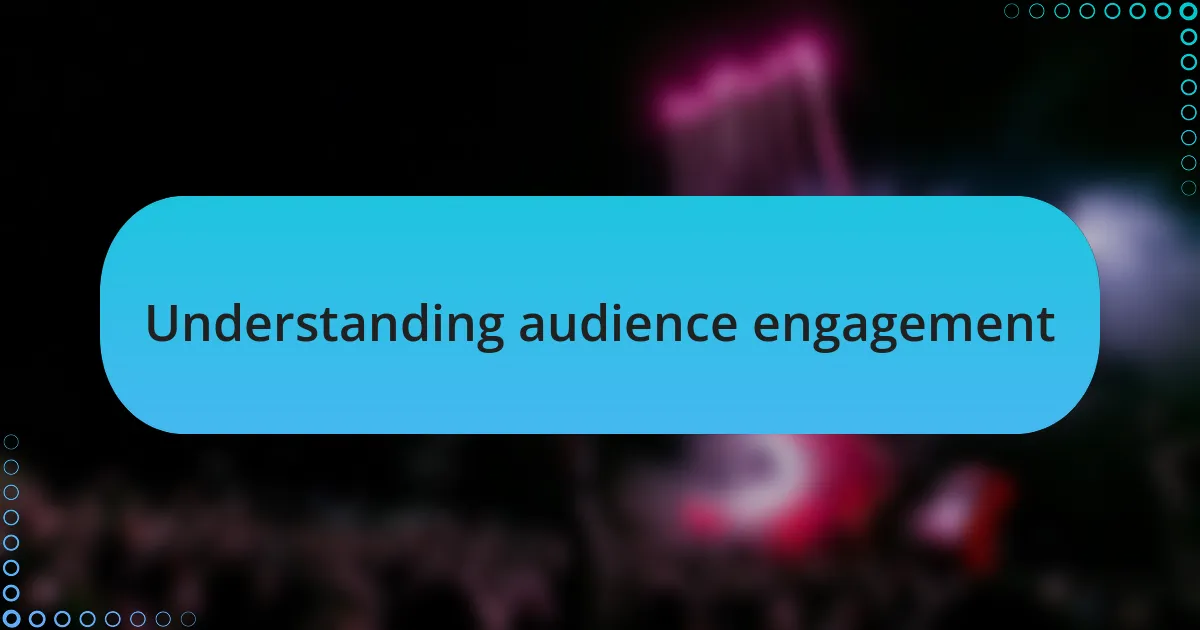
Understanding audience engagement
Understanding audience engagement goes beyond simple metrics; it’s about connecting on a deeper level. I recall a moment when a fan shared how one of our songs helped them through a tough breakup. Their heartfelt message made me realize that each performance and every lyric has the potential to impact someone’s life significantly, transcending entertainment.
Have you ever wondered what makes a listener feel truly connected to music? For me, it often stems from genuine interactions. After a show, a fan approached me, excitedly sharing how they danced with their partner to one of our tracks during their wedding. That type of feedback reinforces the importance of crafting tunes that resonate emotionally, creating moments that people will cherish forever.
Engaging with an audience is also about authenticity. When I share personal stories during concerts or through social media, I notice the way fans respond, nodding in understanding or cheering in empathy. It reminds me that vulnerability fosters a powerful bond; it encourages everyone to share their own experiences, creating a supportive community around our music.
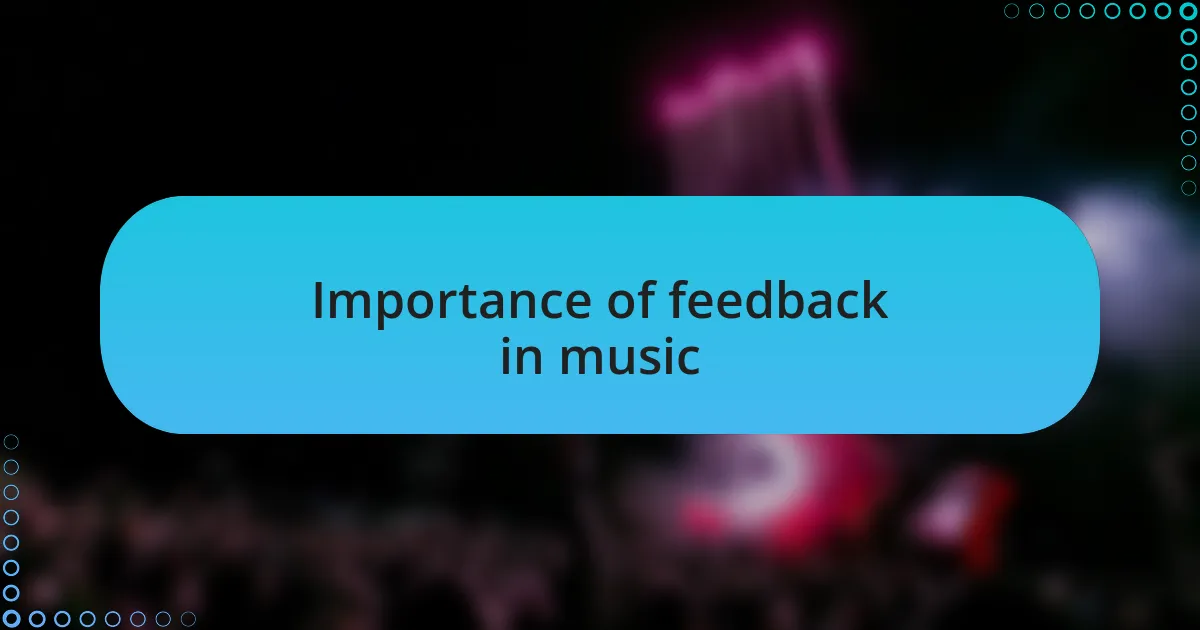
Importance of feedback in music
Feedback in music is essential for growth and connection. I remember receiving a critique on our new album from a longtime listener. At first, it stung a bit, but I took the time to reflect on their perspective. Their suggestions made me rethink certain arrangements, ultimately leading to a more polished final product. It’s a lesson that sometimes honesty, even if hard to hear, can lead to unexpected improvements.
I often find that feedback doesn’t just come through reviews, but in the way audiences respond during live shows. I once noticed fans singing along to a less popular song that I thought had gone unnoticed. Their enthusiasm sparked a realization in me—every piece we create has the potential to touch someone. It made me rethink our setlists and consider which tracks evoke the strongest reactions. How can we fully understand our audience if we don’t pay attention to these moments?
Moreover, feedback can reveal what truly matters to listeners. After a performance, a young artist told me that our music pushed them to start writing their own songs. Reflecting on this encounter, I grasped the idea that our influence reaches far beyond entertainment; it inspires others to express themselves. Hearing such stories reaffirms why I value feedback so highly—it’s not just about us as musicians; it’s about the ripple effect we create in the world of music.
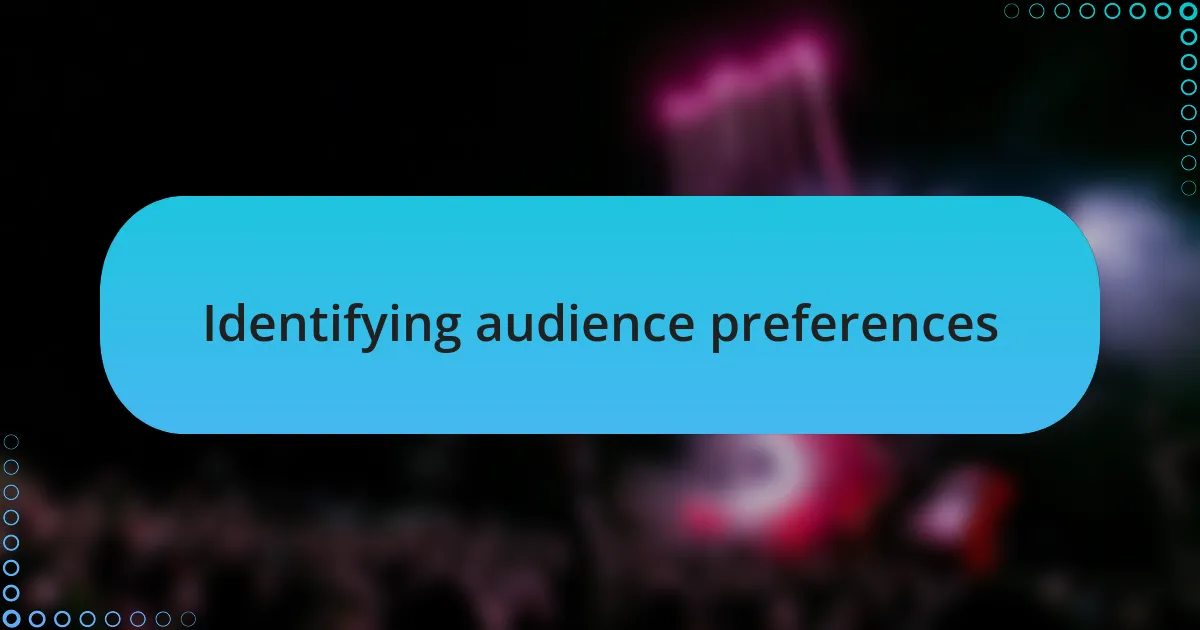
Identifying audience preferences
Understanding audience preferences is like tuning into a unique frequency. For instance, during a recent tour, I noticed a segment of fans clamoring for acoustic versions of our songs rather than the full band arrangements. Their passion opened my eyes to the power of simplicity. Why do we often overlook the quieter moments in music when they can resonate so deeply with listeners?
I’ve also learned that online engagement can provide crucial insights into what fans truly want. A simple social media poll about our next cover song revealed surprising favorites. This interaction wasn’t just numbers; it felt personal. It’s a reminder that fans appreciate being involved in the creation process. How often do we bring them into our world, and how much can we learn from them simply by asking?
Noticing subtle changes in fan demographics helps further identify preferences. At one festival, I met a diverse crowd, from seasoned fans to curious newcomers. Their different reactions to our songs were eye-opening. This experience taught me that expanding our music’s reach means embracing varied tastes and adapting without losing authenticity. What hidden gems could we discover if we actively seek feedback from all corners of our audience?
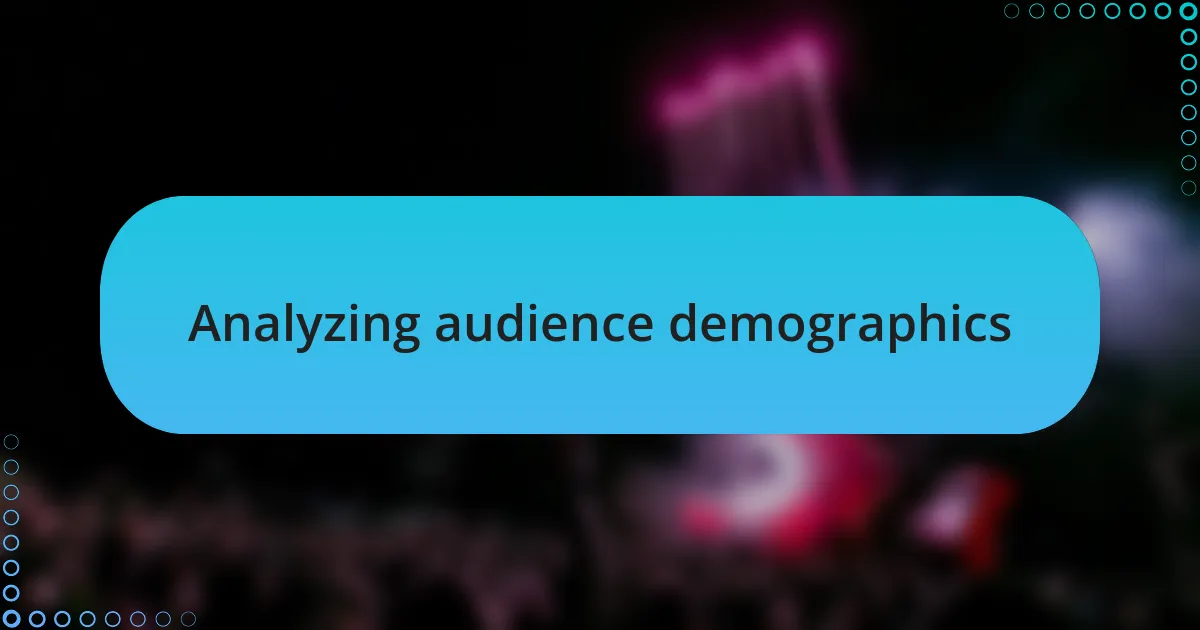
Analyzing audience demographics
Analyzing audience demographics has been a fascinating journey for me. During a recent gig, I found myself chatting with a group of teenagers who were excitedly singing along to a deep cut from our first album. It was a lightbulb moment; understanding that our music spans age groups helped me appreciate how nostalgia can bridge generations. How many times do we underestimate the impact of our earlier work on the younger generation?
I’ve also delved into geographic demographics, which revealed that our fan base is not just local but global. After receiving messages from fans in countries I’d never visited, I felt a surge of responsibility to connect with them meaningfully. Their enthusiasm for our music, despite language barriers, made me realize that music truly knows no boundaries. What stories are hidden in those far-flung places that we could explore together?
Lastly, gender demographics have taught me about the diverse voices in our audience. I once noticed a significant turnout of female fans at a show who expressed their connection to our lyrics on empowerment. Their experiences reminded me that music can be a powerful tool for expression. Are we doing enough to represent and resonate with all genders in our songwriting?
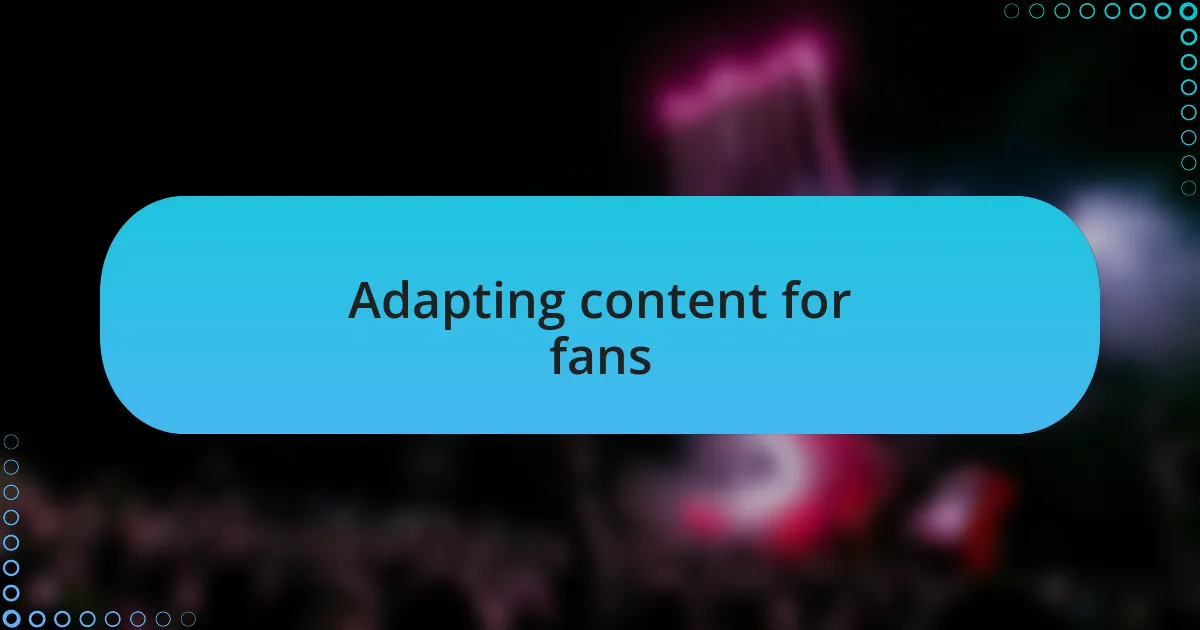
Adapting content for fans
Adapting our content for fans has become a crucial part of my creative process. I remember a moment when I shared a snippet of a new track on our social media, and the engagement surprised me. Fans responded not just with likes but with comments about what the music meant to them personally. It made me realize that when we create, we must think of their experiences and emotions; how often have we thought about how our art can resonate in different yet profound ways?
Another time, during a Q&A session, a fan asked why we didn’t have more acoustic versions of our songs. I hadn’t considered that angle before, but it struck a chord. Acoustic versions would strip back layers, offering an intimate experience that could connect with our audience on a deeper level. Are we, as artists, fully tapping into the varied formats that could enhance our relationship with fans?
Lastly, I’ve often found that when we incorporate real stories from fans into our content, the response is overwhelming. One fan shared how a particular song helped her through a tough time, and it inspired us to create a video series highlighting similar stories. This led me to ponder: how can we utilize these authentic experiences to not only adapt our content but truly honor the voices of those who support us? It’s a continuous journey of learning and evolving, one that brings me closer to both our music and our audience.
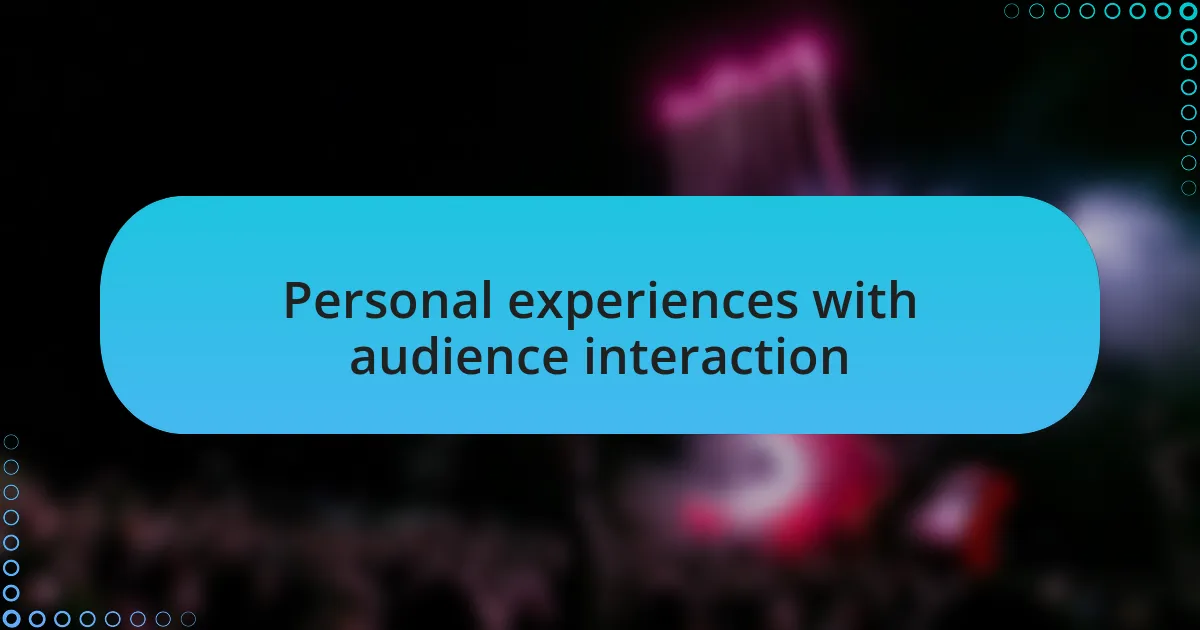
Personal experiences with audience interaction
I distinctly remember the first time I received a heartfelt message from a fan who attended our concert. They told me how our music helped them navigate a difficult chapter in their life, and that feedback hit me in a way I didn’t expect. It made me reflect on the power of music as a healing tool, and I began to ask myself, how can I use our platform to foster more of these connections?
During a recent live stream, I noticed the chat buzzing with fans sharing their interpretations of our lyrics. Some perspectives surprised me, and I found myself thinking, how can I encourage these discussions more often? Engaging directly in the conversation opened my eyes to the diverse ways our audience connects with our work. This interaction sparked new ideas for future songs, emphasizing the importance of understanding the depth of what we create together.
In an unexpected turn, I hosted a small, intimate gathering and invited a few dedicated fans to share their thoughts on our album. Their feedback went beyond just music; they expressed how the themes resonated with their life experiences, making me consider how I could portray our stories more vividly. Have I been truly listening to the messages my audience is sending? It became clear to me that fostering such dialogues not only deepens our connection but enriches my creative vision as well.
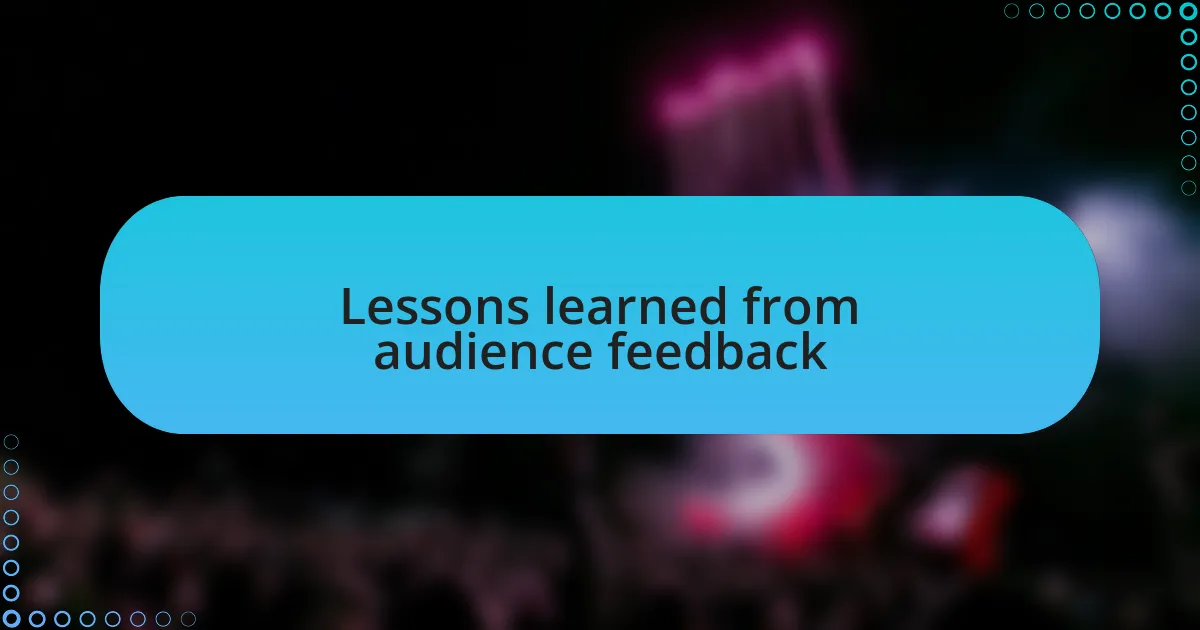
Lessons learned from audience feedback
Gathering feedback from my audience has taught me that every musical piece resonates differently with each listener. I remember one instance when a fan shared how a specific song inspired them during a challenging time. This made me realize that our music is not just entertainment; it’s a source of support and motivation for some. Have I been aware of the impact my lyrics can have on their lives?
Not too long ago, after releasing a new track, I asked fans to share what they thought about it on social media. Some responses were precisely what I hoped for, while others highlighted aspects I hadn’t considered at all. This diversity in feedback prompted me to reflect on how my experiences shape my songwriting. Can I be more inclusive in my creative process by inviting different perspectives?
In another scenario, during a Q&A session, a fan asked me about the meaning behind a song that I thought was straightforward. Their interpretation blew me away and made me realize the beauty in ambiguity. It’s fascinating how a simple question can uncover new dimensions of our work. It’s a reminder to always stay open-minded and embrace the insights my audience offers.